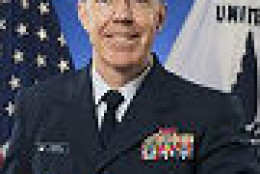Cyber Command
-
Adm. Mike Rogers, commander of the U.S. Cyber Command and director of the National Security Agency, told the House Intelligence Committee that China, and perhaps other countries, will be able to shut down and damage critical infrastructure in the United States by 2025. Richard Stiennon is executive editor of the Security Current blog and founder of IT Harvest. On In Depth with Francis Rose, he said only one part of Rogers' comment seems off the mark.
December 03, 2014 -
At Nevada's Nellis Air Force Base earlier this month, U.S. Cyber Command wrapped up its biggest exercise of the year.
November 19, 2014 -
U.S. Cyber Command is reviewing the results of its biggest exercise of the year. CYBERFLAG is designed to test out the military forces' ability to keep fighting when an adversary is attacking their networks, and to link up cyber forces with the more traditional air, sea, land and space domains. Rear Adm. Kevin Lunday is Cyber Command's director for exercises and training. On In Depth with Francis Rose, he talked about the exercise -- and the three types of teams involved in it -- with Federal News Radio DoD Reporter Jared Serbu.
November 17, 2014 -
The leader of the Army's new Cyber Center of Excellence says his job is not merely to build the cyber workforce, but to integrate that up-and-coming capability with the Army's existing signals and intelligence disciplines.
September 26, 2014 -
The Defense Information Systems Agency will begin to shake up its organizational chart in significant ways beginning on Oct. 1. But officials, so far, are reluctant to discuss the details.
August 25, 2014 -
Under a construct that's still under discussion, the Defense Information Systems Agency would take charge of some portion of DoD's cyber defenses under a new Joint Force Headquarters.
May 29, 2014 -
U.S. Cyber Command is calling for a higher seat on the military's org chart.
March 14, 2014 -
Gen. Keith Alexander, who will soon retire as the first commander of U.S. Cyber Command, said his organization has matured to the point that it should join the club of unified commands that report directly to the President.
March 14, 2014 -
A higher slot on the military's organizational chart for U.S. Cyber Command.
March 13, 2014 -
Command Sgt. Maj. Rodney Harris, the senior enlisted advisor at Army Cyber Command, said the Army is doing a good job at finding the right soldiers with the necessary skill sets to become cyber warriors.
October 23, 2013 -
Gen. Keith Alexander, head of the U.S. Cyber Command and the National Security Agency, said the greatest impact of the ongoing government shutdown on cybersecurity is on the morale of the cyber workforce.
October 16, 2013 -
Department will move away from DoD-specific approaches to cybersecurity, lean more toward informing and relying on governmentwide efforts.
July 08, 2013 -
NIST, charged with developing the nation's first-ever cybersecurity baseline for critical infrastructure, says its job is to provide technical assistance to companies, but industry itself must lead the way. Gen. Keith Alexander said NSA will review the use of contractors.
June 13, 2013 -
On this week's Capital Impact show, Bloomberg Government analysts discuss Fannie and Freddie underwriting practices, how much colleges and universities spend on lobbying, and how BRAC is changing the area around Fort Meade. March 28, 2013
March 28, 2013 -
News and buzz in the acquisition and IT communities that you may have missed this week.
March 22, 2013





